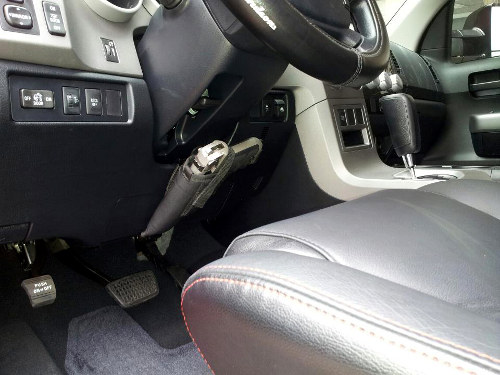
 Author Archive for Jason Lancaster
Author Archive for Jason Lancaster
Jason Lancaster is the editor and founder of TundraHeadquarters.com. He has nearly a decade of experience on the retail side of the auto industry, and another decade of experience of the part and accessory side of the industry.
Insurance Data Says F150 Best, Nissan Titan Worst
The IIHS (Insurance Institue for Highway Safety) is an impartial source of vehicle safety info, such as crash test data, insurance loss rates, and more. Yesterday, the IIHS website shared some information about average loss rates by vehicle make and model, separately reporting loss rates on collisions, personal injury claims, etc. You can view the data for yourself here.

Is the F150 the safest truck on the road? Based on the below-average collision and property damage loss rates, it certainly could be.
However, if you want the long and short of it, the data boils down to this: The F150 has the lowest loss rates, and the Nissan Titan has absolutely the worst. The Tundra is about average.
Search terms people used to find this page:
- tundraheadquarters
Rural Dealerships A Big Sales Advantage for Ford, GM, and Chrysler-Fiat
According to this Automotive News story, GM classifies 1200 of their dealers as “rural.” While the definition of rural is likely a little loose, here’s what we know about GM’s dealership operations:
- GM has 4,400 dealerships across the USA
- 27% of these dealers are rural
- Toyota has about 1200 dealerships across the USA, and a very small portion of them are rural (our sources say less than 10%)
Assuming that each of these 1200 rural GM dealership can sell either Chevy or GMC trucks, and assuming that each of these dealership can sell a measly 5 trucks per month, GM can generate about 70,000 truck sales in rural areas that Toyota can’t hope to match.
In other words, GM has a big sales volume advantage because of their extensive dealership network in rural areas. Ford – and to a lesser degree Chrysler-Fiat – enjoy this sales volume advantage as well. Here’s what it means to Tundra sales figures.
Search terms people used to find this page:
- tundraheadquarters
Quick and Easy Toyota Tundra Gun Mount
Do you need to keep a gun in your Tundra within easy reach? For your sake, I hope the answer is “No.”

Check it - a standard gun holster mounted below the Tundra's steering column. Click for a larger view.
However, if the answer is “yes”, here’s a quick and easy gun mounting tip for you.
2014 Tundra – Are Skinny Tires, a Higher MSRP, and Thin Plastic Panels Our Automotive Future?
Regardless of your political leanings or environmental beliefs, we can all agree that government regulations are often imperfect. The newest CAFE regulations – which mandate a dramatic improvement in new vehicle fuel economy ratings over the next 12 years – are a great example.
Regulators, in an effort to:
- reduce national oil consumption (a good thing considering most of our oil comes from foreign countries), and
- reduce air pollution (also a good thing, at least if you like to breathe as much as I do)
have created a system that is forcing automakers to use every trick in their bag to try and meet this fuel economy mandate. While some of these tricks are admittedly awesome (direct injection, variable valve lift, stop-start systems), other tricks are less desirable…which brings me to skinny tires, thin plastic panels, and the 2014 Tundra.
Search terms people used to find this page:
- tundraheadquarters
Canadian Auto Workers Union Setting Themselves Up For Extinction
This week marks the beginning of serious negotiations between the Canadian Autoworkers Union (CAW) and the domestic* manufacturers Ford, GM, and Chrysler-Fiat. Unlike the UAW, which agreed to a series of concessions during the automotive bail-out, the CAW has been able to maintain roughly the same type of rules that the UAW used to have prior to 2009. Specifically:
- CAW workers are all paid the same wage; UAW workers are on a two wage tier system where newer workers make less than older workers
- CAW workers do not have any profit sharing; UAW workers rely upon profit sharing bonuses
These two mechanisms – two tier wages and profit sharing – are essential to the success of the UAW and the automakers they work for. Yet for some reason, the Canadian autoworkers don’t feel that they need to follow the same set of rules that the American autoworkers follow. If the CAW doesn’t concede, the risk is that automakers will simply abandon Canadian production in the next decade or so…and the CAW will cease to exist.
*I say “domestic” only because that’s what these manufacturers are commonly known as. In truth, they build a substantial portion of their vehicles, powertrains, etc. in Mexico.

